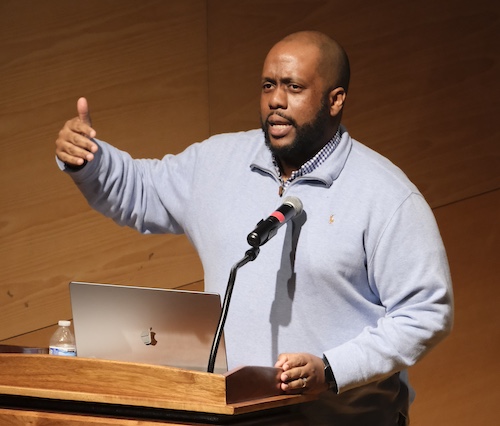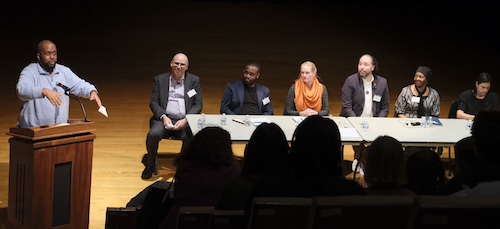The teaching profession is suffering a crisis of staffing and confidence. Over the last decade, we’ve noticed fewer students interested in becoming teachers as demonstrated by diminishing enrollment in teacher preparation programs across the country. Yet, and ironically, education-related studies have expanded through content areas including sociology and psychology. This disconnect speaks not just to post-2020 attitudes about the teaching profession, but also to the lingering effects of reform policies from earlier eras such as No Child Left Behind, which concentrated much of its efforts on standardized testing. For students belonging to Generation Z, how do we encourage them to become teachers or other school-based professionals, where they are sorely needed?
 A coalition of professors and researchers sought to address the issue head on. On January 9, Bank Street College of Education—in partnership with Smith College, Vassar College, Yale University, and Wesleyan University—hosted the Summit on Undergraduate Pathways in Education (SUPE), a one-day gathering geared toward helping prospective educators understand the current landscape of possibility. This inaugural event brought together more than 200 people total, including college students and dozens of experienced educators and stakeholders for an evening of dynamic speakers and performers, an array of workshops, and networking.
A coalition of professors and researchers sought to address the issue head on. On January 9, Bank Street College of Education—in partnership with Smith College, Vassar College, Yale University, and Wesleyan University—hosted the Summit on Undergraduate Pathways in Education (SUPE), a one-day gathering geared toward helping prospective educators understand the current landscape of possibility. This inaugural event brought together more than 200 people total, including college students and dozens of experienced educators and stakeholders for an evening of dynamic speakers and performers, an array of workshops, and networking.
Based on initial feedback from students, we know they not only appreciated the program, but also gained a stronger sense of the passion and dedication required to take on this work. One student from Vassar College remarked, “[The program] really showed me that there are so many different ‘pathways’ into the field of education that look and feel very different, even if they look similar on paper.”
 Many of the workshop leaders and plenary speakers were themselves current and former education practitioners, researchers, advocates, and policymakers who found their way through teaching. As the opening keynote, Dr. José Vilson, research associate at Bank Street and executive director of EduColor, an organization that amplifies the works and ideas of students, educators, and communities of color through supportive networks and professional development, demonstrated the multiple ways he had affected change as a veteran math teacher in the Washington Heights neighborhood of New York City.
Many of the workshop leaders and plenary speakers were themselves current and former education practitioners, researchers, advocates, and policymakers who found their way through teaching. As the opening keynote, Dr. José Vilson, research associate at Bank Street and executive director of EduColor, an organization that amplifies the works and ideas of students, educators, and communities of color through supportive networks and professional development, demonstrated the multiple ways he had affected change as a veteran math teacher in the Washington Heights neighborhood of New York City.
Most poignantly, he spoke about several of his former students who also went on to become classroom teachers. After his keynote, student-led theatre group EPIC Theatre Ensemble performed their play “Why Teach?” The crowd enjoyed the passionate prompts about why teaching matters, even amid tumultuous times. There were also multiple workshops offered with topics ranging from education policy and research to teaching math and reading across K-12.
Throughout the process of developing this summit, the Bank Street team working on SUPE ensured that the event was thoughtfully co-constructed with our undergraduate partners. Amy Stuart Wells, Chief Research Officer, Bank Street College, says, “Through this partnership between liberal arts colleges, we hope to create a pipeline for education professionals aligned with educationally progressive values and the commitment to social justice imbued in Bank Street’s work.”
Sam Intrator, Professor and Chair of Education and Child Studies at Smith College, also said of the event, “I was particularly struck by how the authentic stories of educational journeys resonated so deeply with students. There was something meaningful in hearing each panelist share how their path in education unfolded with unexpected opportunities and evolving roles, all while staying grounded in core values about making a difference.”
 These themes of unexpected opportunities, evolving roles, and core values were made all the clearer not just through José’s keynote for the students, but also the closing panel. The group of experts, moderated by Bank Street President Shael Polakow-Suransky, GSE ’00, offered passionate advice and stories about their journeys in the work. Carolyne Quintana GSE ’08, former deputy chancellor, New York City Public Schools, elaborated on this point by showing how her unorthodox pathway into education was about taking risks at crucial points in her life.
These themes of unexpected opportunities, evolving roles, and core values were made all the clearer not just through José’s keynote for the students, but also the closing panel. The group of experts, moderated by Bank Street President Shael Polakow-Suransky, GSE ’00, offered passionate advice and stories about their journeys in the work. Carolyne Quintana GSE ’08, former deputy chancellor, New York City Public Schools, elaborated on this point by showing how her unorthodox pathway into education was about taking risks at crucial points in her life.
In this way, the organizers are hoping to help rebuild the otherwise leaky teacher pipeline. Rather than the stoic one-size-fits-all approach to teaching, the summit showed a vibrant and multifaceted approach to working in the field of education. Another undergraduate attendee said, “Attending the summit reaffirmed the various pathways to become an educator and reminded me that the opportunity to inspire even one student to learn is enough to motivate me!”